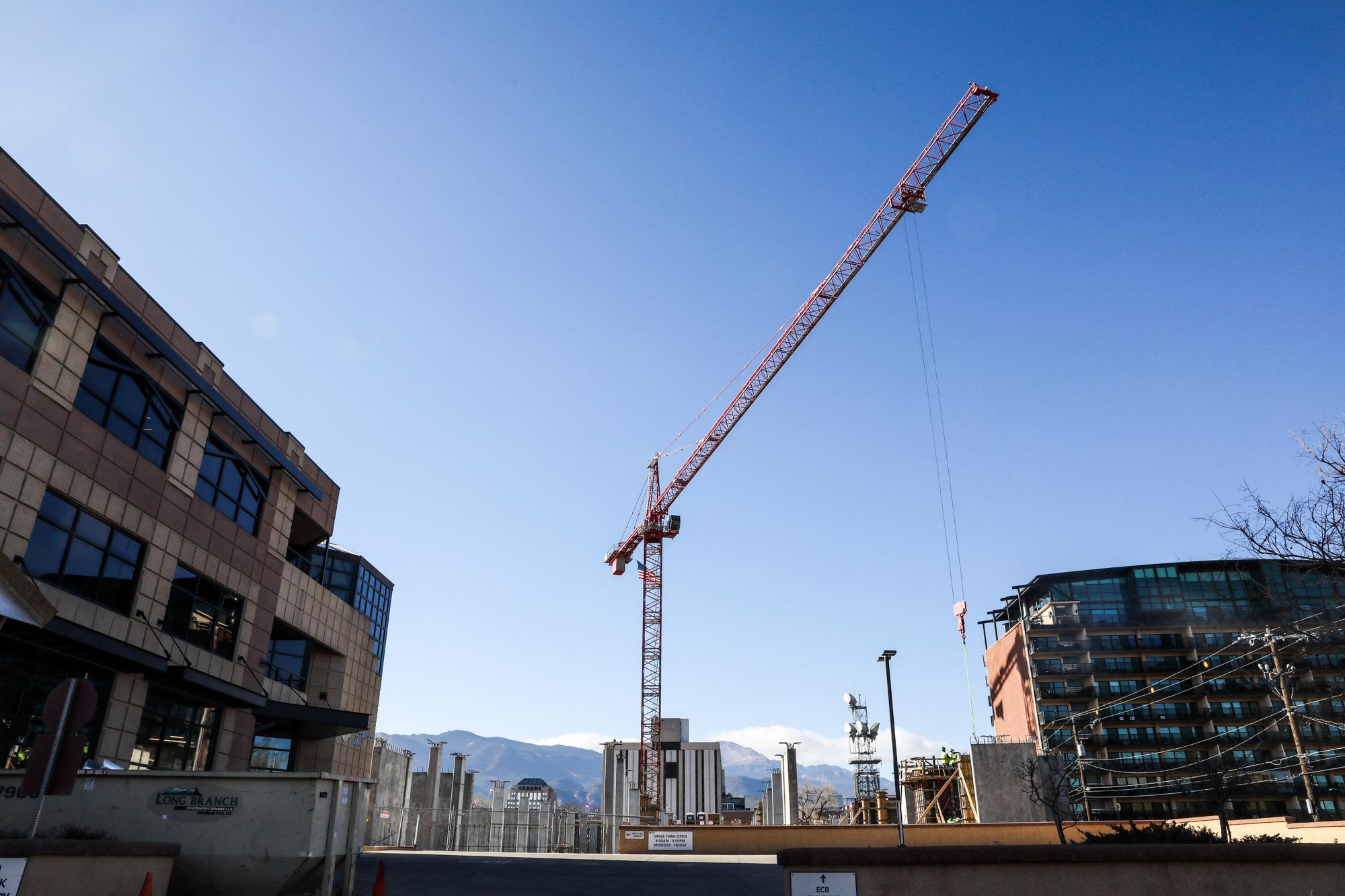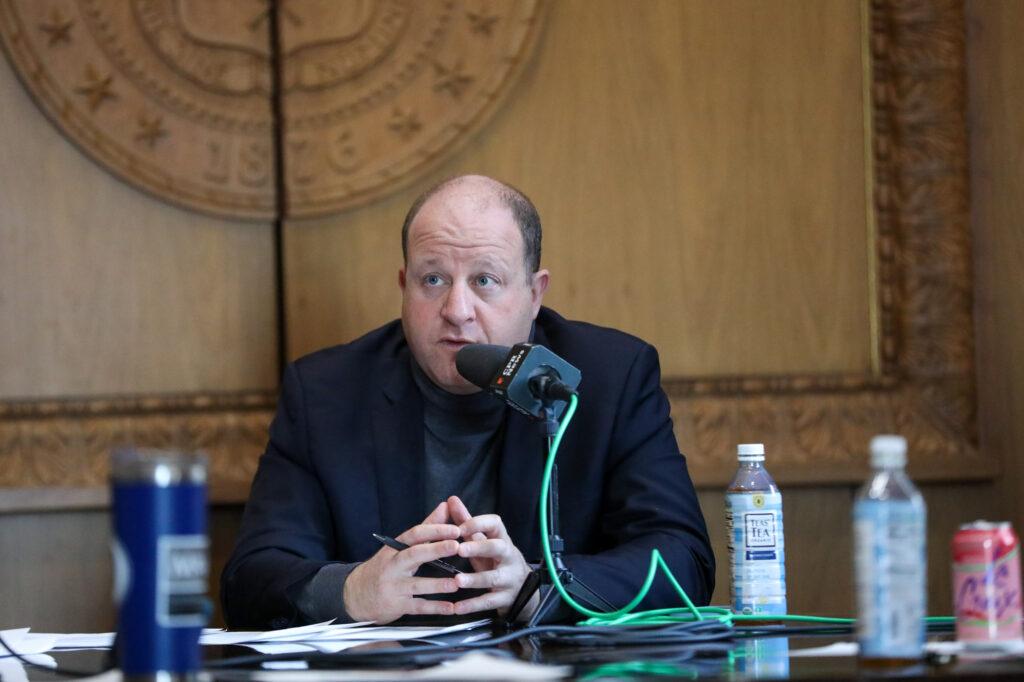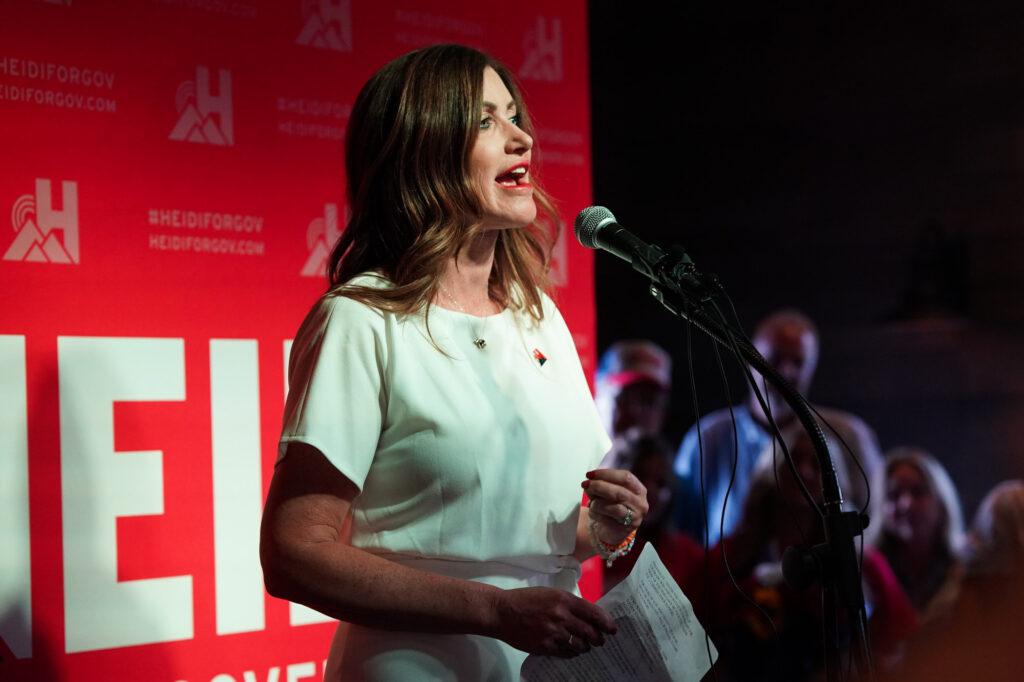
Richard Montoya, 37, says he makes pretty good money as a sales manager. But he feels stalled out, lately, with his wife and three kids in their Thornton rental.
“To buy a house, it’s half a million dollars everywhere in Colorado. It’s just insane,” he said. “You’re kind of stuck in an apartment. You save up and the price just keeps going up.”
Meanwhile, his rent is going up as well, and he worries that Colorado simply won’t be an option for his children when they’re grown. And he’s far from alone: When CPR News spoke to more than 150 voters across Colorado, they rated housing as one of their top concerns in the upcoming elections.
That was especially true for moderates and liberals, but also for some conservative voters like Montoya. Rising housing costs also are a major component of inflation, which was the top priority for voters across the board. For example, the median rent in Colorado Springs has grown 38 percent in the last four years, while home prices are up 70 percent in Pueblo.
It’s part of a national trend, but Montoya wants candidates in Colorado to answer these questions: “Is there a fix in the future? Is there better times? What's their goal for a year from now, five years, 10 years? Or is it just (prices) keep going up until you're forced to move out in Colorado?”
With those challenges in mind, CPR News interviewed Gov. Jared Polis, a Democrat, and his Republican challenger, Heidi Ganahl, about their approach to the state’s housing market over the next four years.
Different approaches, same goal: more homes
Housing shortages can be traced to many roots.
The state saw a dramatic reduction in housing production after the Great Recession, leaving it with a shortfall of new apartments, condos and houses. Colorado also is seeing the long-lived effects of under-investment in affordable housing, advocates say. And it’s all been exacerbated by rising costs for labor and materials following the pandemic.
For his part, Polis described housing as a top priority should he win a second term, hinting at significant new steps that could give the state government a stronger role in what gets built, and where.
The governor said the state must work with cities to reform zoning codes and encourage dense, sustainable development along transit corridors, while limiting exurban sprawl.
“It's a discussion that the state has to have. And if we take action now, I think we can avert some of the devastatingly high housing costs of California and other states,” he said. “You know, people complain about the housing costs in Colorado, rightfully so. But (local housing costs are) still 40 or 50 percent less than California. We don't wanna become California.”
His challenger, Ganahl, said that housing prices are affecting everyone, including her own 26-year-old daughter, who is living at home in Douglas County because of high rental prices. She described herself as a convener who would help local governments plan for “new, cool, innovative” housing, while also trying to cut regulations that slow construction.
“I will be all about vision, and building a vision for our state and what our future looks like here. And I think we've got a lot of opportunity to do things differently,” she said.
For both candidates, government-subsidized affordable housing programs were a secondary focus, even though that’s been one of the state legislature’s main strategies to address housing in recent years.
Instead, they converged on one idea: It’s time for Colorado to build more housing, especially by unleashing private development, and it must do so fast.

Polis says he’ll push for density in second term
Polis said that Colorado’s main housing problem is a lack of housing production. And the state should respond, he said, by encouraging dense and sustainable development.
“In many ways, the lack of housing is a completely contrived problem. It's a problem of our own making. And we can unleash and remove barriers to significantly more opportunities for housing,” he said.
Housing production in Colorado fell off sharply after the Great Recession. It had nearly recovered as the pandemic set in, but is threatened again now by rising interest rates and a shaky market.
The “bigger issue,” Polis explained, is the “hesitancy” of cities and counties to reform zoning rules and other policies that shape development.
“Really, what we need to figure out as a state is how people can afford to live close to where jobs are,” he said. “Exurban sprawl is not the answer. We need to make sure that we get cars off the road, save people time and money on their commute, reduce pollution and have more opportunities to reduce costs and live affordably, close to where your work is.”
Right now, the state has little direct power to encourage cities to make it easier to build more densely, or to discourage suburban sprawl. It can influence those questions indirectly, especially in how it builds roads and other transportation infrastructure. But it’s local governments who generally make the ultimate decisions about zoning and building codes.
Polis said that under his leadership, the state has already offered “carrots” to encourage what he considers better development. Areas that embrace density and public transit are eligible for larger amounts of federal money under laws passed by Democrats this year.
“What we've done is we've tied a lot of that to local zoning reforms,” he said.
He described the incentives as an “initial piece” to ensure “that it wasn't just money shoved into a failing system that fails to deliver housing close to where jobs are, but it (instead) was aligned with incentives for local government to do the right things with regard to an inter-jurisdictional approach to housing,” he continued.
Asked how else he would encourage local zoning reforms, Polis started by describing a “partnership” between the state and cities in his potential next term.
“This is going to be a lot of our work and my focus … is to really solve rather than just pretend to solve, or throw money at, or talk around the edges of the housing affordability crisis in the state,” he said, describing conversations he intends to convene across party lines with everyone from housing, business and industry advocates to environmentalists and others.
But that still leaves a bigger question. Many local leaders have long considered development rules and zoning to be a matter of “local control” — an important concept that has allowed Colorado cities to have power over their own domains. Unsurprisingly, it’s a precedent that local leaders tend to defend zealously.
Would Polis embrace mandates, or a generally stronger role for the state government in housing, CPR News asked?
Polis’ response made clear that he doesn’t see local control as an ironclad rule when it comes to development.
“I think that the state is already involved with housing, of course. What we find more and more is the decisions of one community impact not only themselves,” Polis said.
And issues that cross local boundaries, he said, start to go beyond local control. Local control, he argued, “is about the idea you control your own destiny. It's not, you control the destiny of your neighbors.”
Polis compared housing to transit, which the state is more active in planning and funding.
“We will succeed or fail as a state based on our ability to deliver housing (so) that people can actually afford to enjoy the great life that our state offers and thrive,” he said.

Ganahl targets regulations, calls for rural opportunities
Heidi Ganahl similarly believes that government is getting in the way of development that could ease the housing crunch.
Asked why housing is so expensive, she said that a quarter of the cost of building new residential units come from regulations, including taxes and fees.
“You’ve got to incentivize builders to build here and make it feasible for them to do business,” she said.
Ganahl named a few specific causes, such as lawsuits over defects in condo construction, as well as taxes, fees and “the regulations and red tape” at both the city and state levels.
Like Polis, she wants to see cities allow for greater development, and she sees herself as a “partner” in making that happen.
“We also have to honor this idea that it's really up to the local municipalities to manage their growth, but I can partner with them as a governor, and incentivize them,” she said. She’s interested in ideas like redeveloping malls into housing, creating tiny home villages and encouraging European-style development with “smaller, more efficient” units.
It’s not clear yet what she would do to encourage that kind of development over the next four years. Later in the interview, Ganahl reiterated that she was hesitant to interfere with local government decisions.
“I think it depends on the issue, but overall, I defer to local municipalities or governments to make those decisions. But I can certainly incentivize them and talk about other places that are doing it really well around the world and how we can emulate them and make it exciting and fun and creative.”
That’s similar, in principle, to Polis’ use of financial incentives to encourage greater density. But Ganahl said she didn’t support that kind of use of government funds to influence local policy.
“You know me, I'm more about letting the free markets do their thing and using other kinds of incentives. We've got a lot of problems we've gotta solve in Colorado that we need our government funds for, so I think there's other ways to do it,” she said.
Asked how else she would incentivize innovative ideas, as she hopes to do, Ganahl said she would work with others to develop a plan. She said she was interested in the work of a group of CU architecture students who have been reimagining main streets, as well as a free market-focused think tank called the Common Sense Institute.
In the same answer, Ganahl added that she would fight for water rights.
“That's one of the most important things I can do as governor, is not defer to the federal government to decide what's right for our water. Coloradans should make those decisions,” she said. “And we are the ones who should decide what smart growth looks like, not hand that decision off to the feds.”
She also raised the possibility of helping small towns grow, if they wish, by developing broadband and jobs.
“Let's make sure they have the tools and resources to attract young people moving into the town, or their kids staying there — like healthy broadband and opportunity. And with this work-from-home shift from COVID, I think it's very possible to see our growth happen in more of the smaller towns across our state.”
(Polis didn’t raise broadband in his interview, though he signed a recent executive order to develop a plan “to connect 99% of Colorado households to high-speed broadband by 2027,” along with legislation dedicating money to the cause.)
Ultimately, Ganahl said, the state has to work together to plan for its growth.
“I think it comes back to water, for the most part, and making sure we have enough water to grow, at the right pace,” she said. “But this is a conversation we need to have with the people of Colorado and the local municipalities and the small towns across our state about what their heart is for their neighborhoods and their streets,” she said.
What about designated affordable housing?
Both candidates remained focused throughout their interviews on the question of how to encourage and plan for development. They put much less emphasis on funding for designated affordable housing programs, where the government subsidizes development with below-market costs for residents.
The state currently has record amounts of federal money — about $650 million — going into housing and homelessness programs, but those spending levels will recede in the years to come. Aside from this short-term boost, the baseline spending is about $50 million a year.
Voters also have another housing choice on the ballot. Proposition 123 is the first statewide ballot measure for affordable housing funding, obligating the state to dedicate some $300 million of the annual budget to the cause. The measure wouldn’t raise taxes, but instead divert money from other programs.
Polis declined to say whether he supports Prop. 123, saying he’s still reviewing it. Ganahl’s campaign did not respond to a follow-up question about her position on the measure.
Asked if he would prioritize an increase to affordable funding levels in general, Polis didn’t give a firm answer.
“The housing challenge we face is not an issue that we can buy our way out of. And so what I'm more interested in solving are the policy reasons that Colorado has a housing affordability crisis,” he said.
He continued: “Money's a part of it. Some of that can come from public-private partnerships. Some of that can come from housing authorities. Some of that could come from the state, where we are flush (with money) over the next several years. And there is a question about what we would do in the long term, but it all will be determined, whether it works, by how we're able to remove barriers to the kind of housing that we need in our state.”
He pointed out that affordable housing generally means rental units, which he sees as necessary and welcome. But he said the ultimate goal is the kind of intergenerational wealth building and secure retirement that comes through home ownership.
“We’d really like to build the (subsidized) affordable housing program. It’s helpful to provide a place to live. But it should never hold us back from the kind of reforms we need to build more housing that's affordable … for people to be able to purchase and own and benefit from the appreciation.”
Polis added that he supports models like community land trusts.
Ganahl, like Polis, is doubtful that government-subsidized housing can solve the housing problem by itself.
“It's not working fast enough, so we've gotta have some big, bold ideas on tackling this issue, or we're gonna have some real problems here. Our kids and grandkids aren't gonna be able to stay here,” she said.









